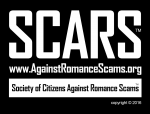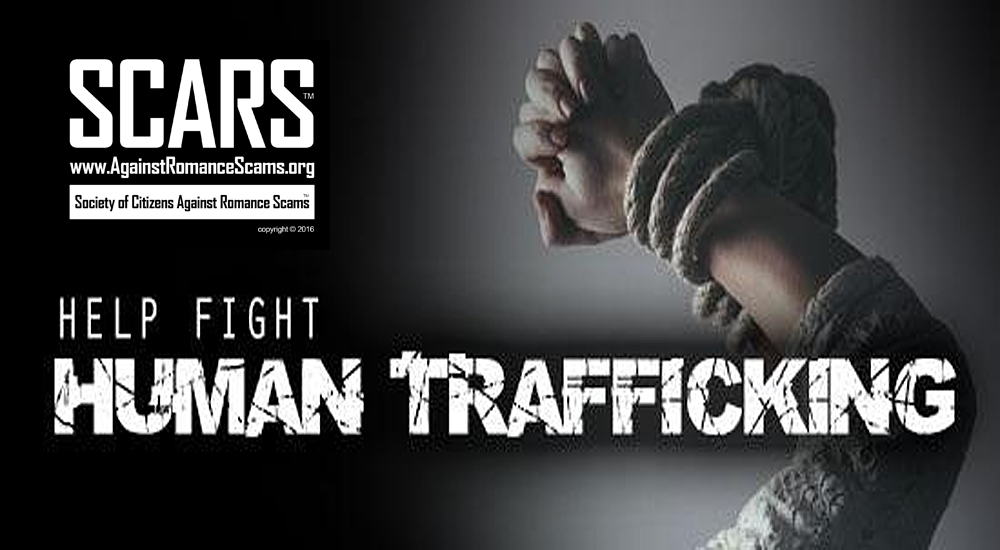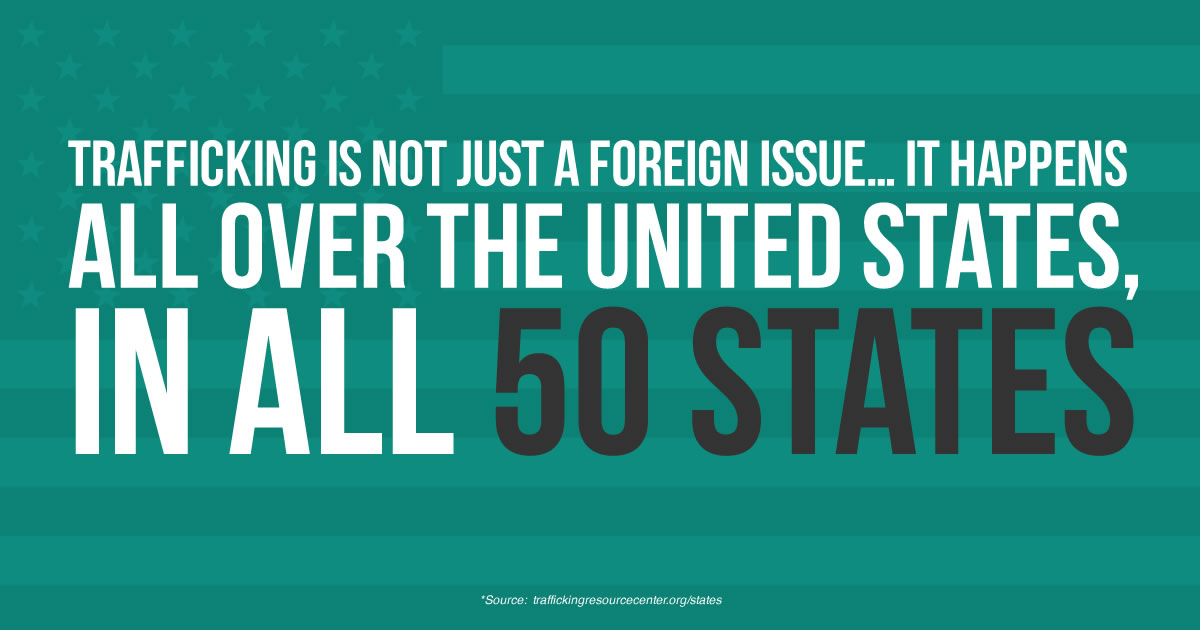SCARS™ Guide: Human Trafficking & Its Relationship To Scamming
Human Trafficking
Many do not know that online fraud is closely related to Human Trafficking and Terrorism. The bad guys that scam the world help fund these activities.
The Society of Citizens Against Romance Scams [SCARS] does all it can to help raise awareness of this important issue. That is why we are proud to help support and be affiliated with Freedom United www.freedomunited.org Please visit their website and see what you can do!
Scams Can Lead To Trafficking
Something that is not known by most Internet Users is that Dating Websites and Social Media Platforms are the prime targets too for Human Traffickers. They use dating profiles and social media to identify and “order” specific victims for capture and then re-sale!
Sex Trafficking
Sex trafficking occurs when victims are forced, defrauded (including false promises), or coerced (including threats against the victim or family member) into performing commercial sex, OR when a person under the age of 18 engages in commercial sex. Sex trafficking may occur in a variety of locations, including strip clubs, massage establishments, delivery or escort services, brothels, hotels, truck stops, or on public streets.
Labor trafficking occurs when individuals are forced, defrauded (such as through false promises), or coerced (including threats against the victim or family members) into performing labor or services. Labor trafficking may include situations of forced labor, requiring victims to work to pay off debts, and involuntary child labor. It can happen on farms, or in bars, private residences, factories, hotels, restaurants, traveling sales crews, and peddling rings.
What is Human Trafficking?
While not all of the indicators listed below are present in every human trafficking situation, and the presence of any of the indicators is not necessarily proof of trafficking.
You May Be A Victim Of Human Trafficking If Someone:
- Forces you to do something you don’t want to do
- Does not pay you for your work or services
- Does not allow you to leave your workplace or home when you want
- Physically, sexually or emotionally abuses you
- Controls your personal identification documents, such as a passport or ID card
- Maintains locks on doors or windows preventing you from leaving
- Recruited you to work with false promises regarding the nature or conditions of your work or living situation
- Requires you to work excessively long or unusual hours
- Denies you food, water, sleep or medical care
- Limits your interaction with other people, including friends and family
- Makes a profit by you being forced to perform sexual acts
If You Are Being Trafficked, You Might:
- Be fearful of the controlling person and what they are capable of doing
- Not be able to make medical decisions for yourself, like when you need to go to the doctor or dentist
- Feel vulnerable, unsafe, or not know who to trust
- Not have access to your wages or money you earn
- Have had your personal documents, like a visa or birth certificate, taken from you
- Not be able to take breaks during work, or work very long hours
- Feel depressed, hopeless, irritable, tearful, or angry
- Have flashbacks, disturbing thoughts, or feelings of isolation
What Can I do?
It can be difficult to know what to do if you have been a victim of trafficking. There are a number of resources available and you can decide which are the safest options for you:
- Call 911 For Immediate Assistance – You know yourself and your situation better than anyone. Trust your instincts and call for help if you feel you are in danger.
- Contact the National Human Trafficking Resource Center – The NHTRC operates a 24-hour hotline at 1-888-373-788 or text BeFree (233733) to talk about your needs, your options, and the resources they have available to help you.
- Contact the National Runaway Safeline – If you are a teen and in need of confidential help and assistance, call 1-800-786-2929 or text 66008.
- Develop a Safety Plan – A personalized safety plan can help you identify ways to stay safe in your situation, if you are planning to leave, or after you leave. There are many resources online, like this one from the National Domestic Violence Hotline, that can help. Consider also calling the NHTRC at 1-888-373-7888 to talk with an Anti-Trafficking Hotline Specialist who can help you plan ways to stay safe.
Contact the VictimConnect.org Resource Center by phone at 1-855-484-2846 or by chat for more information or assistance in locating services that can help you or a loved one who is a victim of human trafficking.
Additional Resources
- The NHTRC Referral Directory has a comprehensive map of human trafficking services across the United States.
- The Directory of Service Providers for immigrant victims of human trafficking was created by the National Immigrant Women’s Advocacy Project. It includes attorneys, advocates, and other legal assistance for victims.
- The Services Available to Victims of Human Trafficking Resource Guide describes the forms of assistance that may be available to trafficking victims. It was written for social service providers and released by the Department of Health and Human Services.
- The Office for Victims of Crime hosts a comprehensive website with resources for victims, providers and law enforcement.

RSN™ Team
a division of SCARS™
Miami Florida U.S.A.
END
– – –
Tell us about your experiences with Romance Scammers in our Scams Discussion Forum on Facebook »
– – –
FAQ: How Do You Properly Report Scammers?
It is essential that law enforcement knows about scams & scammers, even though there is nothing (in most cases) that they can do.
Always report scams involving money lost or where you received money to:
- Local Police – ask them to take an “informational” police report – say you need it for your insurance
- Your National Police or FBI (www.IC3.gov)
- The Scars Worldwide Reporting Network HERE or on www.Anyscam.com
This helps your government understand the problem, and allows law enforcement to add scammers on watch lists worldwide.
– – –
Visit our NEW Main SCARS™ News & Information Facebook page for much more information about scams and online crime: www.facebook.com/SCARS.News.And.Information
To learn more about SCARS visit www.AgainstScams.org
Please be sure to report all scammers HERE or on www.Anyscam.com
All original content is Copyright © 1991 – 2018 SCARS All Rights Reserved Worldwide & Webwide – RSN/Romance Scams Now & SCARS/Society of Citizens Against Romance Scams are all trademarks of Society of Citizens Against Romance Scams Inc.







Leave A Comment